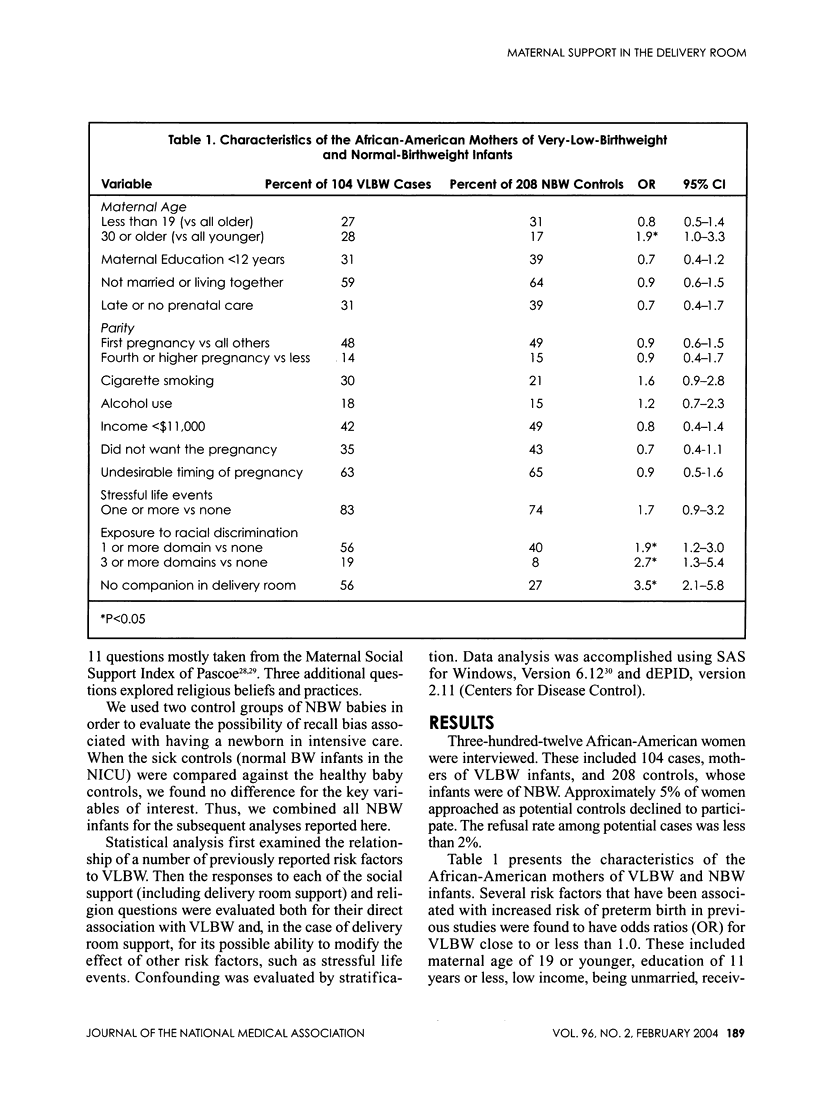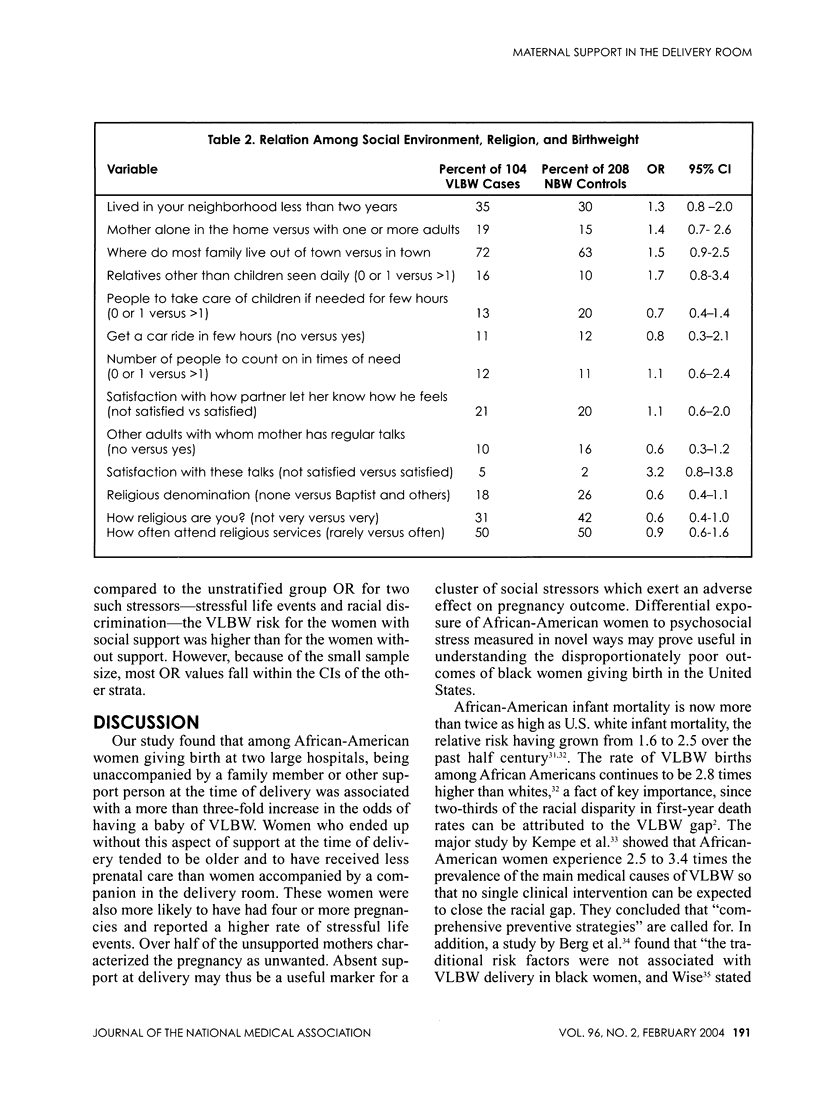Abstract
OBJECTIVES: We performed a hospital-based case control study of African-American mothers to explore the relationship between maternal support by a significant other in the delivery room and very low birthweight (VLBW). METHODS: We administered a structured questionnaire to mothers of VLBW (less than 1,500 g; N=104) and normal birthweight (greater or equal to 2,500 g; N=208) infants. RESULTS: The odds ratio for VLBW comparing women without social support in the delivery room to those with a companion was 3.5 (2.1-5.8). Several traditional risk factors were not associated with VLBW, but older maternal age and perceived racial discrimination were. CONCLUSIONS: Maternal support in the delivery room or factors closely associated with it significantly decreases the odds of delivering a VLBW infant for African-American women.
Full text
PDF








Selected References
These references are in PubMed. This may not be the complete list of references from this article.
- Barbosa G. A. The association of life events to gestational age at delivery among low-income, urban, African American women. J Perinatol. 2000 Oct-Nov;20(7):438–442. doi: 10.1038/sj.jp.7200423. [DOI] [PubMed] [Google Scholar]
- Berg C. J., Wilcox L. S., d'Almada P. J. The prevalence of socioeconomic and behavioral characteristics and their impact on very low birth weight in black and white infants in Georgia. Matern Child Health J. 2001 Jun;5(2):75–84. doi: 10.1023/a:1011344914802. [DOI] [PubMed] [Google Scholar]
- Boone M. S. Social and cultural factors in the etiology of low birthweight among disadvantaged blacks. Soc Sci Med. 1985;20(10):1001–1011. doi: 10.1016/0277-9536(85)90256-4. [DOI] [PubMed] [Google Scholar]
- Collins J. W., Jr, David R. J., Symons R., Handler A., Wall S., Andes S. African-American mothers' perception of their residential environment, stressful life events, and very low birthweight. Epidemiology. 1998 May;9(3):286–289. [PubMed] [Google Scholar]
- Collins J. W., Jr, David R. J. The differential effect of traditional risk factors on infant birthweight among blacks and whites in Chicago. Am J Public Health. 1990 Jun;80(6):679–681. doi: 10.2105/ajph.80.6.679. [DOI] [PMC free article] [PubMed] [Google Scholar]
- Collins N. L., Dunkel-Schetter C., Lobel M., Scrimshaw S. C. Social support in pregnancy: psychosocial correlates of birth outcomes and postpartum depression. J Pers Soc Psychol. 1993 Dec;65(6):1243–1258. doi: 10.1037//0022-3514.65.6.1243. [DOI] [PubMed] [Google Scholar]
- Cooper R., David R. The biological concept of race and its application to public health and epidemiology. J Health Polit Policy Law. 1986 Spring;11(1):97–116. doi: 10.1215/03616878-11-1-97. [DOI] [PubMed] [Google Scholar]
- David R. J., Collins J. W., Jr Bad outcomes in black babies: race or racism? Ethn Dis. 1991 Summer;1(3):236–244. [PubMed] [Google Scholar]
- David R. J., Collins J. W., Jr Differing birth weight among infants of U.S.-born blacks, African-born blacks, and U.S.-born whites. N Engl J Med. 1997 Oct 23;337(17):1209–1214. doi: 10.1056/NEJM199710233371706. [DOI] [PubMed] [Google Scholar]
- Dayan J., Creveuil C., Herlicoviez M., Herbel C., Baranger E., Savoye C., Thouin A. Role of anxiety and depression in the onset of spontaneous preterm labor. Am J Epidemiol. 2002 Feb 15;155(4):293–301. doi: 10.1093/aje/155.4.293. [DOI] [PubMed] [Google Scholar]
- Dole N., Savitz D. A., Hertz-Picciotto I., Siega-Riz A. M., McMahon M. J., Buekens P. Maternal stress and preterm birth. Am J Epidemiol. 2003 Jan 1;157(1):14–24. doi: 10.1093/aje/kwf176. [DOI] [PubMed] [Google Scholar]
- Effects of in utero exposure to street drugs. Am J Public Health. 1993 Dec;83 (Suppl):1–32. doi: 10.2105/ajph.83.suppl.1. [DOI] [PMC free article] [PubMed] [Google Scholar]
- Emanuel I., Hale C. B., Berg C. J. Poor birth outcomes of American black women: an alternative explanation. J Public Health Policy. 1989 Autumn;10(3):299–308. [PubMed] [Google Scholar]
- Feldman P. J., Dunkel-Schetter C., Sandman C. A., Wadhwa P. D. Maternal social support predicts birth weight and fetal growth in human pregnancy. Psychosom Med. 2000 Sep-Oct;62(5):715–725. doi: 10.1097/00006842-200009000-00016. [DOI] [PubMed] [Google Scholar]
- Geronimus A. T., Hillemeier M. M. Patterns of blood lead levels in US black and white women of childbearing age. Ethn Dis. 1992 Summer;2(3):222–231. [PubMed] [Google Scholar]
- Geronimus A. T. The weathering hypothesis and the health of African-American women and infants: evidence and speculations. Ethn Dis. 1992 Summer;2(3):207–221. [PubMed] [Google Scholar]
- Goldenberg R. L., Cliver S. P., Cutter G. R., Hoffman H. J., Cassady G., Davis R. O., Nelson K. G. Black-white differences in newborn anthropometric measurements. Obstet Gynecol. 1991 Nov;78(5 Pt 1):782–788. [PubMed] [Google Scholar]
- Hoffman S., Hatch M. C. Stress, social support and pregnancy outcome: a reassessment based on recent research. Paediatr Perinat Epidemiol. 1996 Oct;10(4):380–405. doi: 10.1111/j.1365-3016.1996.tb00063.x. [DOI] [PubMed] [Google Scholar]
- Hogue C. J., Hargraves M. A. Preterm birth in the African-American community. Semin Perinatol. 1995 Aug;19(4):255–262. doi: 10.1016/s0146-0005(05)80039-4. [DOI] [PubMed] [Google Scholar]
- Hogue C. J., Yip R. Preterm delivery: can we lower the black infant's first hurdle? JAMA. 1989 Jul 28;262(4):548–550. [PubMed] [Google Scholar]
- Hogue Carol J. Rowland, Vasquez Cynthia. Toward a strategic approach for reducing disparities in infant mortality. Am J Public Health. 2002 Apr;92(4):552–556. doi: 10.2105/ajph.92.4.552. [DOI] [PMC free article] [PubMed] [Google Scholar]
- Kempe A., Wise P. H., Barkan S. E., Sappenfield W. M., Sachs B., Gortmaker S. L., Sobol A. M., First L. R., Pursley D., Rinehart H. Clinical determinants of the racial disparity in very low birth weight. N Engl J Med. 1992 Oct 1;327(14):969–973. doi: 10.1056/NEJM199210013271401. [DOI] [PubMed] [Google Scholar]
- Kennell J., Klaus M., McGrath S., Robertson S., Hinkley C. Continuous emotional support during labor in a US hospital. A randomized controlled trial. JAMA. 1991 May 1;265(17):2197–2201. [PubMed] [Google Scholar]
- Klaus M. H., Kennell J. H., Robertson S. S., Sosa R. Effects of social support during parturition on maternal and infant morbidity. Br Med J (Clin Res Ed) 1986 Sep 6;293(6547):585–587. doi: 10.1136/bmj.293.6547.585. [DOI] [PMC free article] [PubMed] [Google Scholar]
- Kleinman J. C., Kessel S. S. Racial differences in low birth weight. Trends and risk factors. N Engl J Med. 1987 Sep 17;317(12):749–753. doi: 10.1056/NEJM198709173171207. [DOI] [PubMed] [Google Scholar]
- Krieger N. Racial and gender discrimination: risk factors for high blood pressure? Soc Sci Med. 1990;30(12):1273–1281. doi: 10.1016/0277-9536(90)90307-e. [DOI] [PubMed] [Google Scholar]
- Lieberman E., Ryan K. J., Monson R. R., Schoenbaum S. C. Risk factors accounting for racial differences in the rate of premature birth. N Engl J Med. 1987 Sep 17;317(12):743–748. doi: 10.1056/NEJM198709173171206. [DOI] [PubMed] [Google Scholar]
- MacDorman Marian F., Minino Arialdi M., Strobino Donna M., Guyer Bernard. Annual summary of vital statistics--2001. Pediatrics. 2002 Dec;110(6):1037–1052. doi: 10.1542/peds.110.6.1037. [DOI] [PubMed] [Google Scholar]
- McLean D. E., Hatfield-Timajchy K., Wingo P. A., Floyd R. L. Psychosocial measurement: implications for the study of preterm delivery in black women. Am J Prev Med. 1993 Nov-Dec;9(6 Suppl):39–81. [PubMed] [Google Scholar]
- Norbeck J. S., Anderson N. J. Psychosocial predictors of pregnancy outcomes in low-income black, Hispanic, and white women. Nurs Res. 1989 Jul-Aug;38(4):204–209. [PubMed] [Google Scholar]
- Oakley A., Rajan L., Grant A. Social support and pregnancy outcome. Br J Obstet Gynaecol. 1990 Feb;97(2):155–162. doi: 10.1111/j.1471-0528.1990.tb01741.x. [DOI] [PubMed] [Google Scholar]
- Oakley A. Social support in pregnancy: the 'soft' way to increase birthweight? Soc Sci Med. 1985;21(11):1259–1268. doi: 10.1016/0277-9536(85)90275-8. [DOI] [PubMed] [Google Scholar]
- Orr S. T., James S. A., Miller C. A., Barakat B., Daikoku N., Pupkin M., Engstrom K., Huggins G. Psychosocial stressors and low birthweight in an urban population. Am J Prev Med. 1996 Nov-Dec;12(6):459–466. [PubMed] [Google Scholar]
- Orr Suezanne T., James Sherman A., Blackmore Prince Cheryl. Maternal prenatal depressive symptoms and spontaneous preterm births among African-American women in Baltimore, Maryland. Am J Epidemiol. 2002 Nov 1;156(9):797–802. doi: 10.1093/aje/kwf131. [DOI] [PubMed] [Google Scholar]
- Pascoe J. M., Ialongo N. S., Horn W. F., Reinhart M. A., Perradatto D. The reliability and validity of the maternal social support index. Fam Med. 1988 Jul-Aug;20(4):271–276. [PubMed] [Google Scholar]
- Pascoe J. M., Loda F. A., Jeffries V., Earp J. A. The association between mothers' social support and provision of stimulation to their children. J Dev Behav Pediatr. 1981 Mar;2(1):15–19. [PubMed] [Google Scholar]
- Phimister Elizabeth G. Medicine and the racial divide. N Engl J Med. 2003 Mar 20;348(12):1081–1082. doi: 10.1056/NEJMp030028. [DOI] [PubMed] [Google Scholar]
- Ramsey C. N., Jr, Abell T. D., Baker L. C. The relationship between family functioning, life events, family structure, and the outcome of pregnancy. J Fam Pract. 1986 Jun;22(6):521–527. [PubMed] [Google Scholar]
- Schoendorf K. C., Hogue C. J., Kleinman J. C., Rowley D. Mortality among infants of black as compared with white college-educated parents. N Engl J Med. 1992 Jun 4;326(23):1522–1526. doi: 10.1056/NEJM199206043262303. [DOI] [PubMed] [Google Scholar]
- Sosa R., Kennell J., Klaus M., Robertson S., Urrutia J. The effect of a supportive companion on perinatal problems, length of labor, and mother-infant interaction. N Engl J Med. 1980 Sep 11;303(11):597–600. doi: 10.1056/NEJM198009113031101. [DOI] [PubMed] [Google Scholar]
- Wadhwa P. D., Dunkel-Schetter C., Chicz-DeMet A., Porto M., Sandman C. A. Prenatal psychosocial factors and the neuroendocrine axis in human pregnancy. Psychosom Med. 1996 Sep-Oct;58(5):432–446. doi: 10.1097/00006842-199609000-00006. [DOI] [PubMed] [Google Scholar]
- Williams David R. Racial/ethnic variations in women's health: the social embeddedness of health. Am J Public Health. 2002 Apr;92(4):588–597. doi: 10.2105/ajph.92.4.588. [DOI] [PMC free article] [PubMed] [Google Scholar]
- Wise P. H. Confronting racial disparities in infant mortality: reconciling science and politics. Am J Prev Med. 1993 Nov-Dec;9(6 Suppl):7–16. [PubMed] [Google Scholar]


